
Unless you’re exceptionally well informed, some of the information presented here is going to shock you. Many people, who are lucky enough to live in first-world countries, have a somewhat insular view of life in other less fortunate, developing parts of the world. Many things are taken for granted, including our access to safe and readily available medicines.
Sadly, there are billions of people around the globe who cannot be certain they will be able to buy necessary life-saving medicine; nor can they be certain if the medicines they buy are real or counterfeit.
Let’s be clear about what we’re talking about. Counterfeit medicines are intentionally made to look and feel like the real medicine, but contain either no active ingredient, the incorrect amount of active ingredient, or contain other harmful ingredients. [1]
Counterfeit drug manufacturers can be extremely opportunistic, and their practices can include [2]:
- counterfeiting an expensive drug when demand is high;
- tampering with original packages;
- swapping of labels; and
- labelling low-priced products with a high-priced product label.
The global counterfeit drug industry is estimated to be worth hundreds of billions of dollars per year. [3]
Deaths caused by these counterfeit drugs are estimated between 100,000 and 1 million people per year. [4] The large margin of error exists because of a lack of information. Anti-malarial and cancer drugs, heart medications, HIV/AIDS and meningitis vaccines are all popular counterfeiting choices in many developing countries. However, there have also been numerous instance of counterfeit drugs in first-world countries, including the USA. [5]
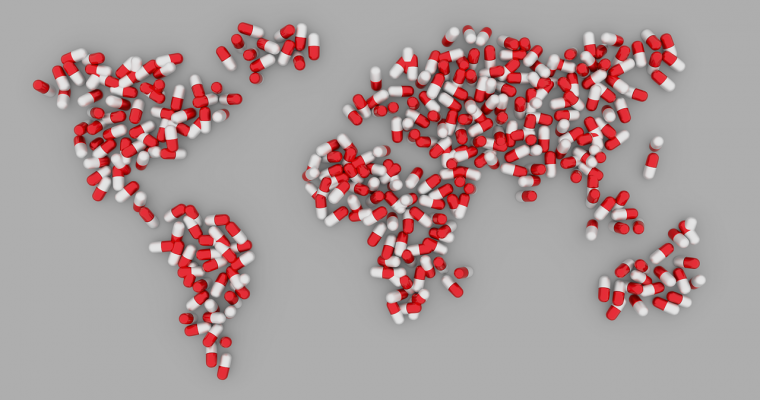
Consider these examples:
- In 1995, 50,000 people in Niger were inoculated with fake meningitis vaccines, resulting in 2,500 deaths. [6]
- A total of 192,000 people in China were reported to have died in 2001 from counterfeit drugs. Chinese authorities, in that same year, “closed 1,300 factories while investigating 480,000 cases of counterfeit drugs worth 57 million USD”. [7]
- Between 2002 and 2003, a South East Asian multinational survey was conducted for the anti-malarial tablet, Artesunate, and samples were purchased from various drug sellers, shops and pharmacies. 92 % (56/61) of the packets purchased in Vietnam were found to be counterfeit, containing only trace or no active ingredient. [8]
- In 2012, the Washington Post reported on a counterfeit version of Avastin, a widely used cancer drug, circulating in the USA, which was found to contain salt, starch, acetone and other chemicals, but no active ingredient. [9]
- 500+ deaths (mostly children) by renal failure, spanning several decades and multiple countries around the globe, caused by diethylene glycol (car anti-freeze) in fake paracetamol syrup. [10]
These examples are not simply isolated instances, but a small sample of a vast global problem.
Earlier this year, the World Health Organisation released a Fact Sheet stating, “An estimated 1 in 10 medical products in low- and middle-income countries is substandard or falsified”. [11] That’s a statistic for all medical products, not just drugs. Anecdotal evidence suggests that counterfeit drugs could be as high as 30% in developing countries.
Imagine, just for a second, that you live in a developing country, where the chances of buying counterfeit drugs are high. You go to your local pharmacy to buy a packet of drugs — something, for example, like a heart medication, which is meant to improve or stabilise your heart function. How do you know whether the packet of drugs you take home is genuine or a counterfeit? If the counterfeit packages and tablets look and feel identical to the real ones, how does anybody — you, the pharmacist, your doctor — know whether they are safe to take?
In fact, none of us can currently be 100% certain of the medicines we buy, unless we go to the manufacturer and collect them personally.
But as we look into the future, there’s hope on the horizon. The cryptocurrency revolution, and more specifically, blockchain technology, may be exactly what is needed to allow us to be certain that, in the future, the medications we take are legitimate.
FarmaTrust, a crypto-startup venture from the United Kingdom, is set to revolutionise the packaging, transportation and certainty of genuine drugs through the use of blockchain technology and AI.
In simple terms, FarmaTrust have devised a method of labelling and identifying every individual drug package with an immutable, unique ID code that can be tracked and traced from the manufacturer to consumer, through the entire supply chain.
All elements of the supply chain will be able to check and confirm the product is legitimate, from customs officers, regulatory authorities, hospitals, and your local pharmacist. Even you, as the consumer, will finally be able to scan the unique ID code on the packet (using an App, on your phone or via a website) after you collect your medicine from the pharmacy, and get confirmation that it is a legitimate product, not a counterfeit. End-user customers will be able to check their purchased medicine packets for free (excluding internet/phone/data usage charges).
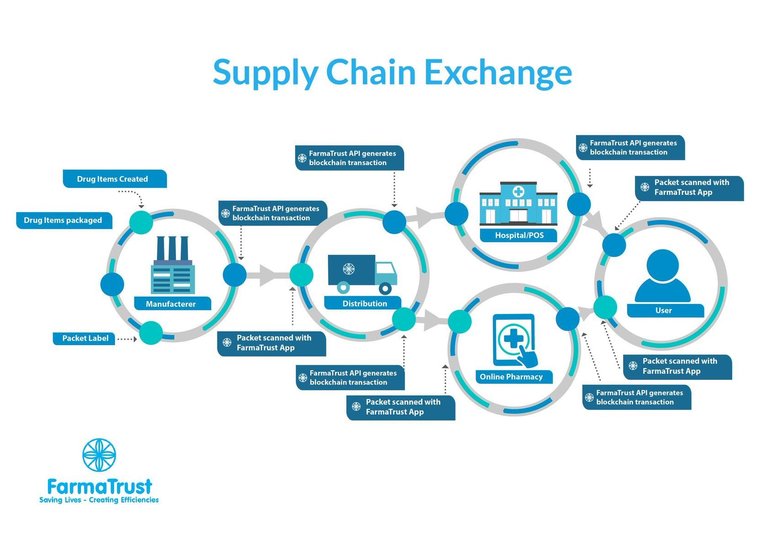
This isn’t all hot air and imagination either. FarmaTrust have a working prototype ecosystem, Zoi, which is hardware and software neutral, meaning it can work with any and all existing manufacturing systems. The blockchain technology platform created by FarmaTrust will allow for absolute verification that the drugs you buy are genuine.
The track and trace functions built into FarmaTrust’s Zoi platform will help combat the proliferation of counterfeit drugs and allow all supply chain participants to confirm the pedigree of a specific packet of medication, through the immutability of blockchain technology.
The adoption of FarmaTrust’s technology will be a boon for the pharmaceutical industry, and not simply because it will be a deterrent to counterfeit drugs. The Zoi ecosystem’s AI will also assist with improvements to delivery routes, production schedules, and asset tracking/coordination.
Changes to government regulations means that drug manufacturers will soon be required to track and trace the drugs they manufacture. In the U.S, the regulations kick-in later in 2018. In the EU, it is 2019.
This means drug manufacturers will need to be able to show regulators they have systems implemented that meet the new regulatory requirements. The FarmaTrust technology gives pharmaceutical companies the track and trace functionality they need for compliance.
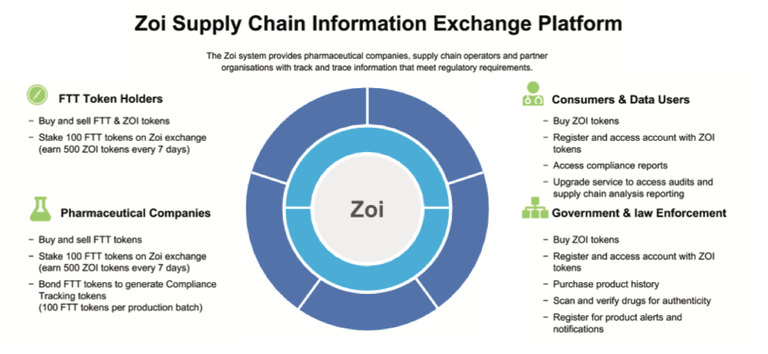
The FarmaTrust system environment utilises a Holder-Utility twin-token system. FTT Tokens, which are being sold in the upcoming relaunch of the Initial Coin Offering (ICO) from 1 June 2018, are the Holder Token component.
FTT Tokens have 2 primary functions:
- Bonding, for regulatory tracking of a batch of drugs; and
- Staking, to generate ZOI Tokens.
FTT Tokens will also be tradable on the open crypto market.
ZOI Tokens, which are the Utility Tokens that are the internal currency of the Zoi ecosystem, are generated by staking FTT Tokens within the Zoi Staking Wallet within the Zoi ecosystem.
ZOI Tokens are not tradable on the open crypto market, but do have multiple purposes within the Zoi ecosystem.
Each lot of 100 FTT Tokens staked on the Zoi platform will generate 500 ZOI Tokens per week, which can be sold to pharmaceutical companies, government, law enforcement, or other data users within the Zoi platform.
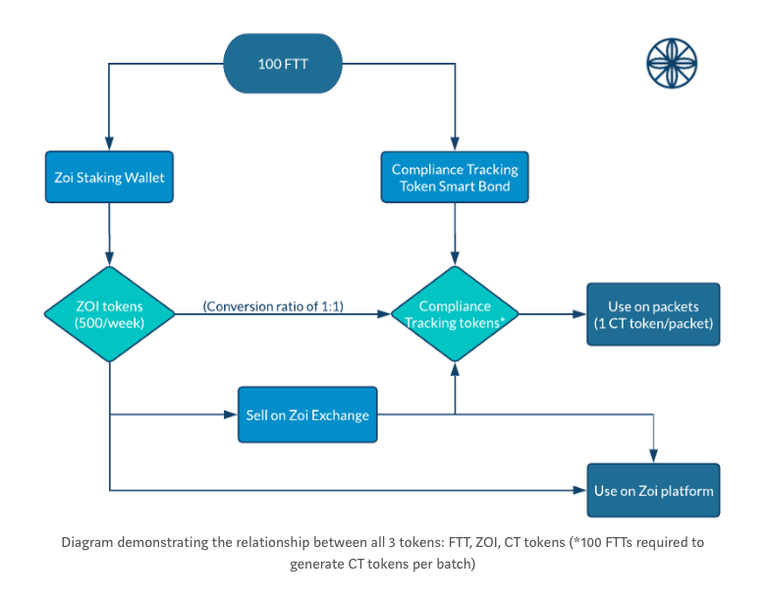
Only pharmaceutical companies can bond their FTT tokens (100 per batch-run) within the Zoi ecosystem, to generate the Compliance Tracking Tokens that are attached to packets of drugs. These bonded FTT Tokens are only released once the entire batch run is sold to consumers or returned to the manufacturer (eg. past use-by date).
If pharmaceutical companies don’t own sufficient FTT tokens to bond a batch-run, they need to purchase ZOI Tokens from within the internal marketplace of the Zoi platform at a rate of 1 ZOI to 1 Compliance Tracking Token. ie. if the batch run is 10,000 packets of drugs, then 10,000 ZOI tokens must be purchased to convert to Compliance Tracking Tokens.
A pharmaceutical company would ideally want to purchase sufficient FTT tokens to allow for an uninterrupted supply of FTT for bonding purposes. They would need sufficient FTT tokens to accomodate a continual production life-cycle, from manufacture of a batch to it’s exhaustion, allowing for batch frequency and overlap, for every product line they produce.
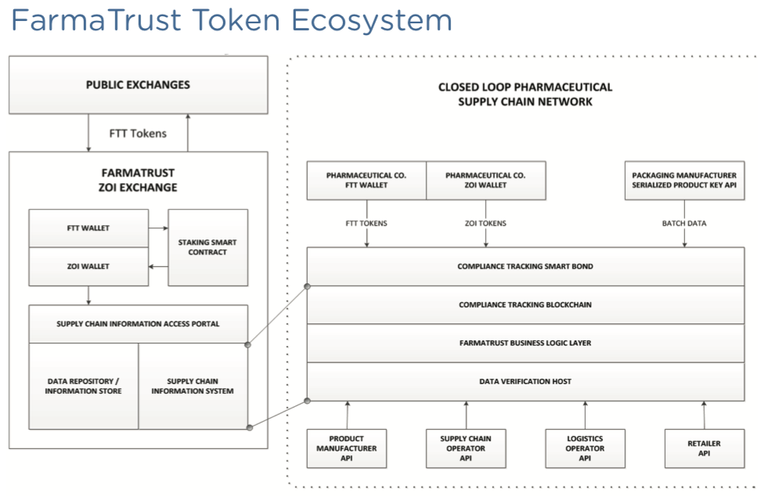
As a crypto-investor, we would be hoping that manufacturers don’t buy enough to cover their entire production-exhaustion cycle, thus forcing manufacturers to buy additional ZOI Tokens to cover their production runs (in addition to selling your ZOI Tokens to the other users identified earlier).
As manufacturers adopt the Zoi platform for their track and trace compliance requirements, the higher the demand for FTT Tokens will become. During the tokensale, this will be reflected by more announcements of manufacturers partnering with FarmaTrust and the eventual success of the tokensale.
Once the Zoi platform goes live after the tokensale, manufacturers and other token holders will inevitably stake their FTT Tokens, thereby removing them from the pool of FTT Tokens available for sale or purchase.
As new manufacturers subsequently adopt the Zoi platform, demand for FTT Tokens on the open crypto-market will increase, which should hopefully be reflected in an adjusted market value.
In conclusion, from a humanitarian perspective, and as far as industry-specific applications for cryptocurrency go, I see the FarmaTrust technology doing more good for the world than any other crypto-project in history. I look forward, with excitement, to seeing where the project takes us.
This article has been prepared in response to: https://steemit.com/blockchain/@originalworks/260-steem-40-bonuses-sponsored-writing-contest-farmatrust
farma2018
Congrats! First place! excellent.
Congratulations on 1st place, well earned!
Congrats on first place.
Congratulations @aussiesloth! You have completed some achievement on Steemit and have been rewarded with new badge(s) :
Click on any badge to view your own Board of Honor on SteemitBoard.
For more information about SteemitBoard, click here
If you no longer want to receive notifications, reply to this comment with the word
STOPInteresting article, subscribed, I hope for reciprocity!
Submitted.
well desrved win my dear
ur article was comprehensive
congratulations